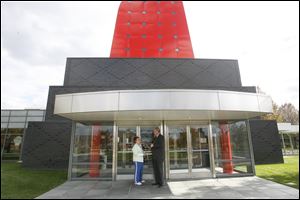
EDITORIALS
Pay and stay
Owens Corning’s agreement to stay downtown has obvious benefits for Toledo, but also costs to taxpayers
10/26/2013
The entrance to Owens Corning's headquarters in the Middlegrounds.
It's good for Toledo, on balance, that Owens Corning and Mayor Mike Bell’s administration have reached a deal that evidently will keep the corporation’s world headquarters — and the 1,250 employees who work there — in the city through at least 2030. But the agreement comes at an appreciable cost to taxpayers; City Council members who must approve the deal will express their judgments about whether it is appropriate.
In return for renewing a lease that otherwise would expire in 2015, Owens Corning will get a package of economic incentives worth an estimated $7 million from city government, as well as contributions from the state, the Toledo-Lucas County Port Authority, and Toledo Public Schools. Taxpayers ultimately will bear the cost of the tax breaks — in higher taxes, in foregone services that the revenue could have paid for, or both.
Click here to read more Blade editorials.
The deal also calls for Owens Corning to receive the land beneath its headquarters in 2030; the current agreement scheduled that transfer for 2075. The city owns the headquarters building in the Middlegrounds along the riverfront.
City officials and Owens Corning executives argue — with merit — that the company’s contributions to the city and regional economy greatly exceed the cost of the tax incentives. The headquarters employees’ $200 million annual payroll yields $3 million a year in city taxes.
Owens Corning also says it plans to add 50 jobs there within three years, and to upgrade the building. The company’s presence has contributed to the revitalization of the Warehouse District, helping to attract other development to the area.
The company got generous incentives to move its headquarters to the waterfront after it vacated the Fiberglas Tower in the 1990s; the latter building remains vacant, a blot on the downtown landscape. When it faced bankruptcy a decade ago, the port authority gave Owens Corning a break on lease payments for its headquarters to help it stay solvent.
Owens Corning, which makes building materials, is the last Fortune 500 company still based in the city. It would have been tough for Toledo to forfeit that last link to its more-prosperous past. Mayor Bell said the city “could not afford to lose” such a conspicuous corporate citizen, which observes its 75th anniversary next week.
That appears much less of a concern now. Still, whenever public economic-development subsidies go to a private company, the question always arises: Is the return worth the investment? In this instance, the answer appears to be yes — but the cost to taxpayers must always be kept in mind.